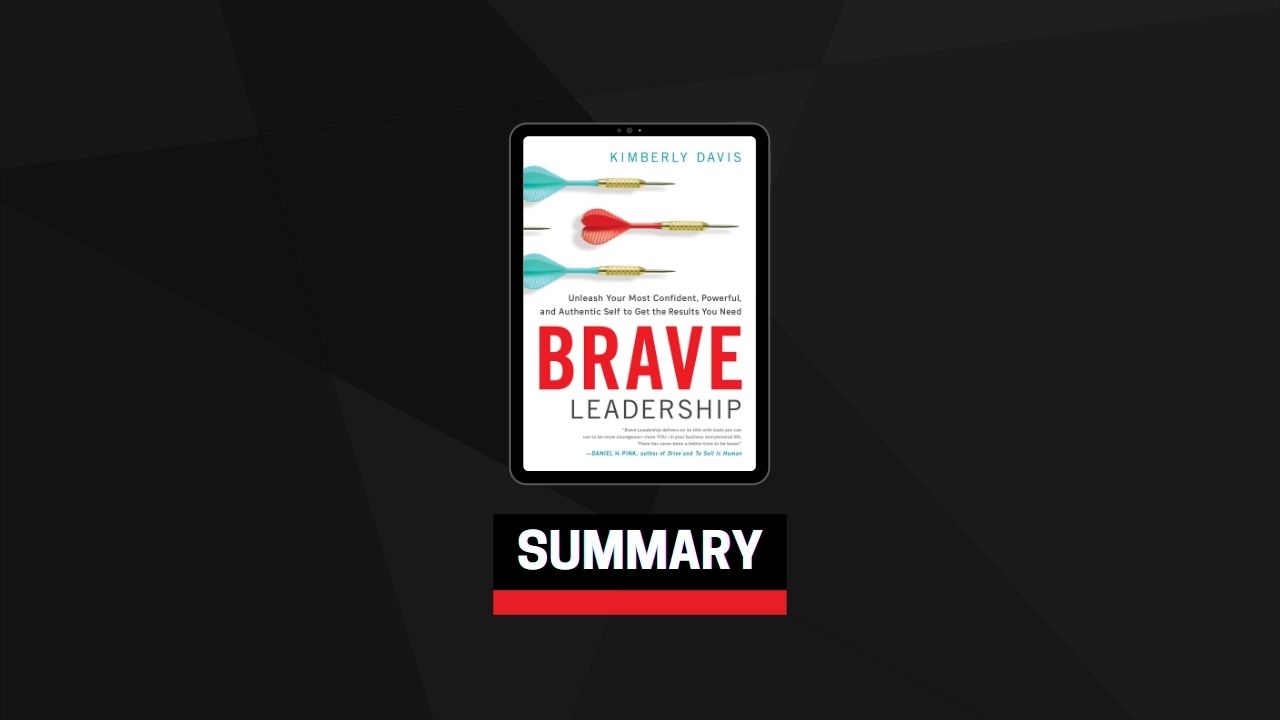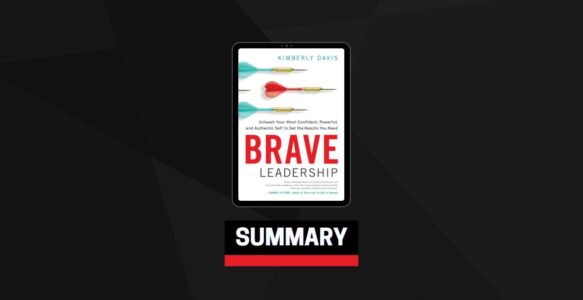Who Are You as a Leader?
Leadership is not about title, position, or power. A leader is someone people want to follow, not have to follow.
To be a brave leader, it’s critical that you begin asking yourself, Do the people I need to follow me want to follow me?
A Whole New World
The world of work has changed dramatically over the past fifteen years. Security is a thing of the past. The workplace is more complex, uncertain, and ambiguous than ever, the speed of business has increased exponentially, and information channels have multiplied. Jobs require cognitive thinking and critical decision-making skills.
Companies must be able to harness the passion, engagement, commitment, and loyalty of their workforce to succeed in today’s competitive marketplace.
Command-and-control leadership is no longer effective in today’s work environment as it repels top talent and retains the least confident, creative, productive, and effective workers.
If you want to be a brave leader, it’s critical that you recognize that the kind of leadership that worked in the past is no longer effective with today’s workforce.
Dealing with Real
If leadership is about ensuring people want to follow, not have to follow, you must connect to the positive emotions of people you lead and influence.
Emotion overpowers logic. While someone may logically understand something, if they’re not emotionally bought in, you will never get their best work.
If you want to be a brave leader, you must be willing to connect to the hearts of those you wish to lead and influence.
Redefining Leadership
Because there have been so many changes in the workforce over the past fifteen years, there are fewer role models in senior leadership.
Our traditional means of motivation at work—the carrot and stick—isn’t effective in getting the best results out of people in today’s workplace.
Unless you harness the “want” of the people you need to lead and influence, your ability to succeed is compromised.
If you want to be a brave leader, you must recognize you have a responsibility to model a new kind of leadership for tomorrow’s leaders.
Unlocking the Want
To want is a gut instinct. It’s desire. To want is a decision made by the heart.
In the end, the heart will win. If you don’t want it, it shows.
In the context of Brave Leadership, we define authenticity as “genuine, worthy of trust, reliable, and believable”—in the eye of the beholder. Thus, the people you lead and wish to influence get to decide if you’re authentic, not you.
The people in your life have unique needs, so what they need from you to experience you as authentic will be different.
To be a brave leader, it’s critical to ask yourself, Do the people I need to lead and influence experience me as genuine, worthy of trust, reliable, and believable?
Disappearing Genius
Because of our personal histories and life experiences, we unconsciously create barriers to being brave.
We often limit ourselves based on false understandings of our histories and experiences.
Both positive and negative histories and experiences impact our self-perception and our ability to take powerful action. It’s not just the “bad stuff” that can limit our mindset.
In attempt to (consciously or unconsciously) meet our basic human needs, we often stop ourselves unnecessarily, without even knowing we’re doing it.
If you want to be a brave leader, it’s critical to recognize that your histories and experiences do not determine what is possible for you.
What Do You See?
We see what we want to see and look to prove ourselves right.
Our perception often blinds us to a more effective way of looking at a situation.
Our actions are a direct result of our perception.
By simply challenging our perception we can dramatically shift our experience and results.
How we interpret the behavior of others is greatly influenced by the way we look at a situation. Our reactions, then, are often triggered by misinterpretations and a lack of information. It’s important to look at the root cause of behaviors and continue to seek to understand why someone is doing what they are doing, even if it doesn’t make sense to you.
To be a brave leader, it is critical to challenge the way you look at the situations in your life.
Step Out of the Box
To make sense of the world around us, we unconsciously sort and index and catalogue everything in our path.
This natural human instinct often limits our perception and our ability to take powerful action.
People especially don’t fit into a box. Who we are is bigger than just one thing.
If you want to be a brave leader, it’s critical to challenge how you might be limiting yourself and others due to confined thinking.
Vulnerable You
All human beings experience vulnerability. Being brave requires navigating vulnerability, not trying to avoid it.
Vulnerability triggers chemical reactions in our brain that produce warning signs and body sensations that are often disproportionate or a misrepresentation of the true risk we face.
We all have unique strategies (like overcompensating or withdrawing) to protect ourselves when we feel vulnerable that don’t always serve us.
If you want to be a brave leader you must understand how vulnerability affects you, physically, emotionally, and mentally; examine your coping strategies; and ensure you navigate vulnerability constructively.
Where Are You . . . Really?
Presence begins with being present.
A lack of presence is rarely intentional; it’s often simply an unconscious survival mechanism.
As a leader, if you are not present with those you lead, you put their want at risk.
When we are concentrating deeply, people often misinterpret our lack of presence. It is vitally important to choose how and when we are present with others, rather than operating on autopilot.
If we want people to experience us as authentic (genuine, worthy of trust, reliable, and believable), then we must find a way to be present with them.
If you want to be a brave leader, you must ask yourself, How present am I with those I wish to lead and influence? How do I know that they experience me as being present?
A Matter of Focus
At work, we’re always on stage, because people are always watching.
The heightened situations in our lives negatively impact our performance when our thinking is self-related (e.g., What do they think about me? What if I mess up? What’s in it for me?).
People who perform powerfully when the stakes are high are able to take their focus off of themselves.
If you want to be a brave leader, you must focus your attention outside yourself. Ask yourself, What do I want my impact to be (on my employees, my clients, my students, my patients, my industry, my organization, my culture, my community, etc.)?
Goals Are Not Enough
Goals are not enough. In our zeal to get the biggest reward quickly, we often sacrifice our values, relationships, health, and best selves in the process.
Though achieving goals feels good physiologically (it taps the pleasure center in our brains) and psychologically (it allows us to satisfy many of our core needs), it can be extremely difficult to determine when achieving our goals shifts from being self-actualizing to self-destructive.
When we’re trying to prove ourselves, we are our own biggest roadblocks to being powerful.
If you want to be a brave leader, it’s critical to ensure that your goals are anchored in your Super Objective to ensure your achievements don’t come at the sacrifice of your relationships, health, values, and best self.
Action from the Inside Out
A leadership philosophy and knowing your values are only starting points to powerful results. You can strongly believe something, but that does not change anything—beliefs alone are not actionable.
A Super Objective puts you on an active path to better results.
You cannot achieve a Super Objective without taking action.
Whether you achieve your Super Objective lies in the eye of your beholder. If you want to be a brave leader, it’s critical to ask yourself, Are my actions having the impact I want them to have?
Connection Is the Game
It’s all about connection.
Leadership is about connection. Either you connect in a way that people want to follow, or you don’t.
Influence is about connection. Either you connect in a way that they want to listen and consider your point of view, or you lose the chance to effect change.
Presence is irrelevant if you don’t connect. If you’re presenting and you don’t connect with the people in your audience, you might as well be talking to yourself!
To connect better at work:
- Take initiative
- Be curious
- Be present
- Listen for commonalities
- Remove the mask
- Share personal stories
- Connect like your life depends on it
A brave leader’s results are a by-product of their ability to truly connect with the hearts and minds of others.
Six Steps to Prepare for Impact
Great results don’t happen by accident—brave leaders prepare.
Here are six steps for preparing powerfully for any situation you face:
1.Focus your attention.
2.Prepare authentically.
3.Breathe and release tension.
4.Be present.
5.Pay attention to impact.
6.Create rituals.
Own Your Mess
We all make occasional mistakes and have reactions we’re not proud of.
The people you lead and need to influence have a tremendous capacity for forgiveness if you’re willing to own your behavior. While you may move on, if you haven’t made it right with others, they won’t forget and it will cost you their want. Apologies without excuses and justifications are critical.
You cannot escape yourself. No matter the circumstances, when you behave in a way that’s not congruent with your values, purpose, and best self, you know it. Misalignments become assassins for your self-belief and efficacy.
We all have emotional triggers rooted in our personal experiences that lead us to react poorly. Stay curious and observe your feelings to better understand your triggers and stop your reaction before it costs you the want of others.
Nobody gives their best for a paycheck exchange. If you want to be a brave leader, it is critical to recognize and appreciate the effort and work that is being done to make your business succeed. Otherwise, you risk the passion, commitment, loyalty, creativity, trust, enthusiasm, and energy—the want of the very people you need most.
A Brave Legacy
Only in being true to who we are at our core can we tap into our best; and all the riches in the world feel meaningless if they’re not anchored in something greater than ourselves. It is having an impact that is the key to a brave legacy.
If you want to be a brave leader, it is critical to become conscious. Conscious of your own needs and desires. Conscious of all the quirky and obnoxious things you do that aren’t working for you. Conscious of your body and breath and voice and mind. Conscious of the impact you have on the people in your life and the world you inhabit. Conscious of how you are both vulnerable and so very powerful.
What now, brave leader? What is the impact you will have on your world? Conscious impact. Brave.


